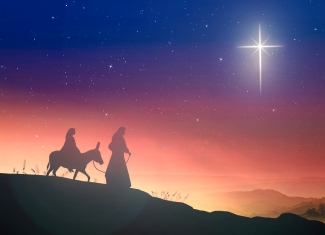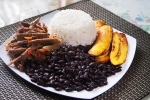November 2020
Spiritual Wellbeing
Las Posadas and the Journey to Bethlehem
This article is also available in Spanish here. Este artículo está disponible en español aquí.
In my 32 years, I have never had a white Christmas. For me, Christmas is not complete without attending a few posadas.
Growing up like everyone else in the U.S., I watched the traditional Christmas movies – A Charlie Brown Christmas, Rudolf the Red-Nosed Reindeer, Miracle on 34th Street, Jingle Bells and many other Christmas classics. The one thing they had in common was snow. Snow, that majestic, white, fluffy powder that signifies that it’s time to light the open fire and roast the chestnuts. Or, when the weather outside is frightful but the fire is so delightful, and since we've no place to go – Let it snow, let it snow, let it snow!
To me in Miami, Christmas was the day I hoped it would be cold enough to wear a sweater. Most years, it was a cool 79 degrees. Christmas was an illusion from mainstream America. Most of the country is not aware that the lower half of the globe experiences a warm Christmas. South of the equator it's actually summer. Imagine a Christmas in summer weather!
Discovering posadas in the Episcopal Church
I was 19 years old when I came to the Episcopal church where I was introduced to the posadas. If you have never heard of or experienced a posada, I suggest you find a Hispanic/Latino church and make some friends.
“What is a posada?” you may ask. Las Posadas commemorates the journey that Joseph and Mary made from Nazareth to Bethlehem in search of a safe refuge where Mary could give birth to the baby Jesus. It is celebrated from December 16th to the 24th. Keeping it simple, it’s a gathering of friends from the neighborhood and church at someone’s house. A party, if you like to call it that. We all know Hispanics know how to throw parties!
I remember my first posada. It was one of the best experiences I’ve had. Growing up as an immigrant in the U.S., it always feels like you’re borrowing from everyone else’s cultures. Nothing ever feels like an authentic experience. Rather, it is what America has told you Christmas is. The posadas immediately felt like this is ours, and we get to share it with you.
What happens during the posada
All posadas start the same. The people gather on the street, there are a few guitars, maybe some animals (depending on how serious they take their posada). The music starts and everyone begins to sing and walk through the neighborhood asking for a place to stay. This is known as pidiendo posada. You walk to a few houses and are turned away by the owner. You do this by singing in call and response. When you finally arrive at the host’s house, everyone begins to sing joyfully, as you have now found a house that welcomes you. The words below are the words to that part of the song.
Entren santos peregrinos, peregrinos, Enter, enter, holy pilgrims, holy pilgrims,
reciban este rincón welcome to my humble home.
Aunque es pobre la morada, Though ’tis little I can offer,
os la doy de corazón. all I have please call your own.
The beautiful thing about it is that no posada is the same. At least in Miami it’s not. We are so diverse in South Florida that when you go to a posada, it feels like you just got your passport stamped. I’ve had Mangu, Arepa, Empanada, Sancocho, Tacos, parrillada, pupusa, baleadas, nopal and have even drunk mamajuana y coquito at a posada.
Sometimes people can get so competitive when they host a posada, that it is important to remind ourselves why we are all gathered together. We are reminded of the journey Joseph and a pregnant Mary took to find a place to stay. We are reminded of how they were turned away many times. Most importantly, we are reminded of how one person who did not have much, shared what he could to provide shelter for them. God shows us this in our lives. He takes those who don’t have much and gives them what they need to share his glory.
Culture and faith are shared in the posadas
The glory that we share is what both Joseph and Mary shared with the world. God’s glory in human form. Posadas are near and dear to me, because it was through this tradition that I was able to find God in a place that was not my home, in a borrowed country. Most of the people with whom I have shared posadas came to this country in search of a better life. They are people who have sacrificed their lives to be somewhere that does not resemble home. Posadas are something that we, as Hispanic people, are able to share with our neighbors and truly make it feel like our Christmas.
Christmas may be on the 25th for most of the world, but for Hispanics it starts on the 16th and is celebrated on the 24th. At midnight we open our presents and celebrate the 25th. The day of the 25th is devoted to consuming leftovers and meeting up again. Some cultures are known to make soup in the morning to feed everyone who stayed over. There are families who have even begun opening their presents on Christmas morning.
The most important thing to take from the posadas is that while it is much the same every time, it is also very different. Similar to Hispanic people. We may have the same language and share the same values, but we are all different. We eat differently, dance differently, worship differently, even use our own language differently. One blanket Christmas service or posada is not enough to express more than 20 countries. Let us show you how we do Christmas and you might never go back.
Raul Diego Veizaga is a son of immigrant parents. Born in Bolivia and raised in Miami Beach, Florida, he is one of the coordinators for Young Adult Ministry for the Diocese of Southeast Florida. He is also one of the content creators for the Latino/Hispanic Ministries of the Episcopal Church. He is dedicated to bringing and creating digital content to the Episcopal Church that allows people to worship from any place in the world.
Resources:
- Sharing Posadas / Compartiendo posadas, a Facebook community
- Feast of the Transfiguration 2020 by Michael Carney, an ECF Vital Practices blog, August 6, 2020
- Why Share Stories? by Julie Lytle, Vestry Papers, November 2014
- On Christmas Pageants...and Chaos by Richelle Thompson, an ECF Vital Practices blog, December 15, 2017
- Las Posadas: Hospitality & Evangelism by Robert Williams, Vestry Papers, November 2012






